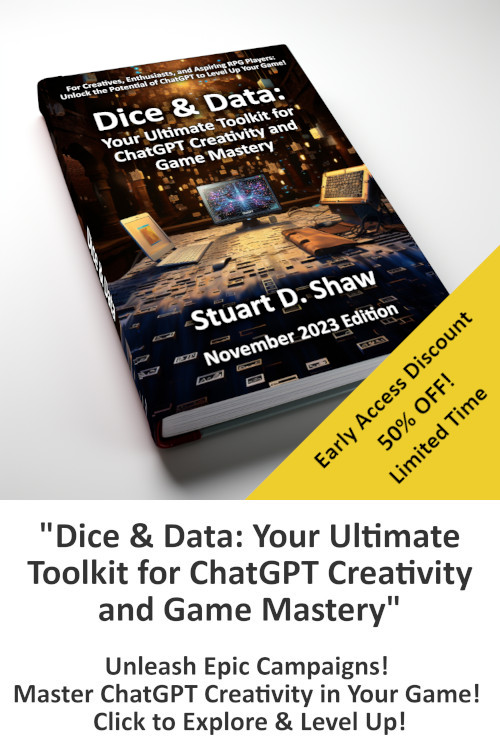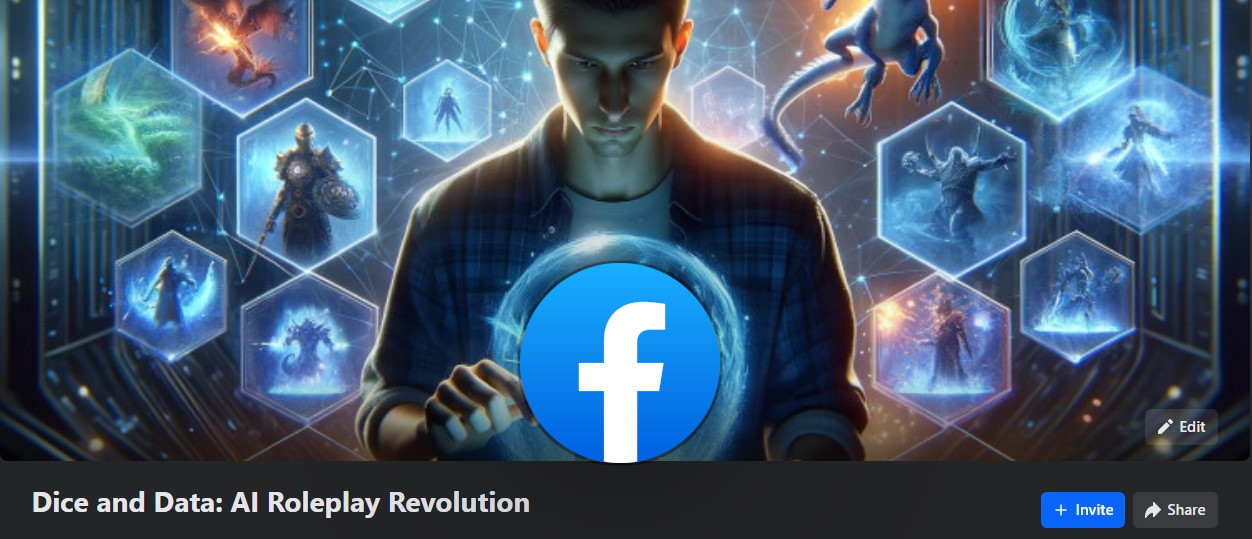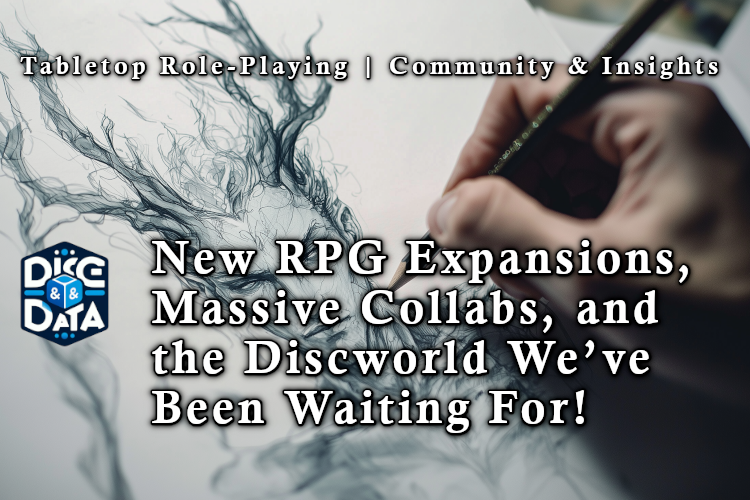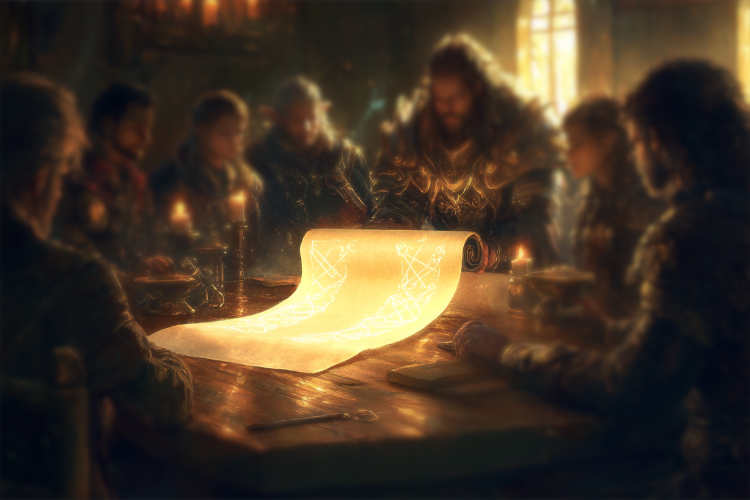
- Home
- RPG AI Blog
- Integrating AI in RPGs
Integrating AI in RPGs: A New Era of Creative Storytelling
The story of role-playing games (RPGs) is one of constant evolution, from humble beginnings with dice and paper to the digital age's wonders. Initially, these games relied heavily on imagination, with dice rolls determining fate and hand-drawn maps guiding adventurers. As technology advanced, so did RPGs, gradually incorporating digital tools to enhance gameplay. This shift from purely physical components to digital assistance marks a significant chapter in RPG history, reflecting broader societal shifts towards embracing technology in everyday life.
The digital era brought with it an abundance of resources for RPG enthusiasts. Online platforms, software for map creation, and character management tools have become staples in modern role-playing. This digital transformation, while preserving the core essence of RPGs, introduced efficiency and accessibility, making the games more inclusive and diverse. The integration of AI is the latest step in this evolution, offering a new toolkit for enhancing storytelling and world-building.
However, this transition has not been without challenges. Purists argue that excessive reliance on digital tools can dilute the authentic experience of traditional role-playing. This debate highlights the need for a balanced approach, where digital advancements, including AI, serve as complements rather than replacements for the human-driven elements of RPGs.
The Challenge: Balancing AI and Human Creativity in RPGs
The integration of AI into RPGs presents a unique challenge: striking the right balance between technological innovation and the preservation of human creativity. This balance is crucial, as it ensures that AI tools enhance rather than overshadow the human element that is the soul of role-playing. The key lies in using AI as a facilitator, not a replacement, for the storytelling and imaginative aspects that define RPGs.
AI can serve various roles in RPGs, from generating content to assisting in complex world-building. However, the concern arises when AI begins to dictate the narrative or gameplay, potentially reducing the role of the game master and players in crafting their story. To prevent this, it is essential to establish boundaries for AI's involvement, ensuring that it remains a tool under human control and guidance.
This challenge also extends to the players' perception of AI's role. Maintaining transparency about how AI is used in the game can help preserve the integrity and authenticity of the RPG experience. It's about enriching the game with AI's capabilities while honoring the human touch that brings the game to life.
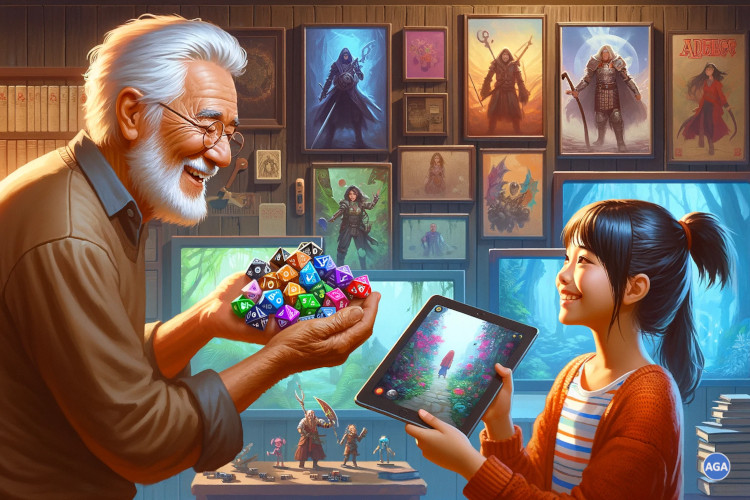
Innovative Storytelling: Integrating AI in RPGs for Enhanced Creativity
Innovative storytelling in RPGs, empowered by AI, opens up a realm of possibilities for enhanced creativity. AI can generate rich, complex worlds and backstories, providing a depth that might be challenging to achieve manually. This can lead to more immersive and engaging game sessions, where the boundaries of creativity are continually expanded.
The use of AI in storytelling goes beyond mere efficiency. It introduces a layer of unpredictability and diversity in narratives. By feeding AI with various sources and influences, game masters can create unique and diverse storylines that might not emerge from traditional brainstorming methods. This not only saves time but also brings a fresh perspective to the storytelling process.
However, integrating AI in storytelling must be done thoughtfully. It is vital to ensure that the generated content aligns with the game's tone and setting. The game master plays a crucial role in curating and modifying AI-generated content to fit seamlessly into the game's narrative, ensuring that the stories remain personal and relatable to the players.
Case Studies: Successful Integrations of AI in Tabletop Gaming
Examining case studies of successful AI integrations in tabletop gaming provides valuable insights into the practical application of this technology. These examples showcase how AI can be leveraged to enhance the gaming experience without compromising the essence of role-playing. From automating mundane tasks to generating intricate plot lines, these cases illustrate the diverse roles AI can play in RPGs.
One notable example is the use of AI in creating dynamic, responsive worlds. By inputting basic parameters, game masters can use AI to flesh out detailed settings, complete with histories, cultures, and ecosystems. This not only enriches the game world but also allows for more spontaneous and responsive gameplay, as the AI can adapt the world in real-time based on player actions.
Another case study involves AI-assisted narrative development, where AI tools are used to generate plot hooks, character backstories, and even dialogue. This assists game masters in keeping the story fresh and engaging, especially during long campaigns. Importantly, these tools are used as supplements to the game master's creativity, ensuring that the personal touch and spontaneity of tabletop gaming are preserved.

Your Next Adventure: How to Start Integrating AI in Your RPG Sessions
For RPG enthusiasts eager to integrate AI into their sessions, the journey begins with understanding the capabilities and limitations of AI tools. It's important to approach this integration with a clear goal: to enhance the gaming experience without overwhelming the human elements that make RPGs unique. Starting with simple tasks, like generating names or locations, can be an excellent way to familiarize oneself with AI's potential in gaming.
The next step involves experimenting with more complex AI functionalities, such as creating non-player characters (NPCs) or plotting minor story arcs. This gradual integration allows game masters and players to gauge the impact of AI on their gameplay and make adjustments as needed. It's crucial to maintain an open dialogue within the gaming group, ensuring that all members are comfortable and engaged with the level of AI integration.
Lastly, it's vital to remain flexible and open to feedback. Integrating AI into RPGs is a dynamic process, and what works for one group may not work for another. Regularly assessing and discussing the role of AI in your sessions will help ensure that it enhances rather than detracts from the gaming experience.
Looking Ahead: The Future of AI in Role-Playing Games
Looking towards the future, the possibilities for AI in role-playing games are boundless. As AI technology continues to advance, its potential to transform RPGs grows exponentially. From creating more complex and interactive worlds to assisting in real-time game management, AI's role in the future of RPGs is both exciting and unpredictable.
One future development could be AI systems capable of understanding and adapting to the unique styles and preferences of different gaming groups. This level of personalization would enable AI to provide a more tailored gaming experience, further enhancing the role-playing adventure.
However, as we gaze into this promising future, it remains imperative to keep the essence of role-playing games intact. The heart of RPGs lies in human creativity, storytelling, and connection. As we embrace AI's advancements, we must also ensure that these core values are preserved, maintaining the magic that makes role-playing games a beloved pastime for so many.
Join The Conversation: Share Your Thoughts!
We value your insights and invite you to be a part of an engaging discussion about the ethical implications and creative horizons of integrating AI In RPGs. Connect with fellow enthusiasts, share your perspectives, and explore diverse opinions in our community. Choose your preferred platform and dive into the conversation today!
Join Our Discord Community: Engage in real-time discussions with artists, tech enthusiasts, and fellow readers on our Discord channel. Share your views, ask questions, and connect with a vibrant community passionate about the intersection of AI and art.
>> Click Here to Join the Discord Discussion
Visit Our Facebook Post: Prefer Facebook? No problem! Join the conversation on our dedicated Facebook post. Leave your comments, read others' opinions, and engage in a dynamic dialogue about AI's role in art. Like, comment, and share to keep the discussion going.
>> Click Here to Participate in the Facebook Discussion

Written by Stuart Shaw, a 40-year veteran of tabletop role-playing games. His journey started with Dungeons & Dragons in 1983, and he is the author of "Dice and Data: Your Ultimate Toolkit for ChatGPT Creativity and Game Mastery". Stuart is eager to share his passion and expertise with the world and enjoys writing about news and innovations in the RPG world. Join him on an exciting adventure into the world of TTRPGs. About me.
